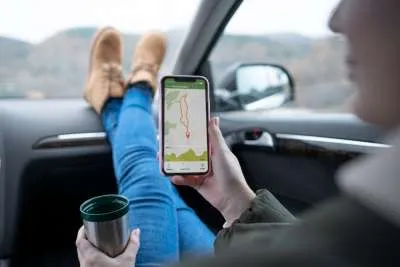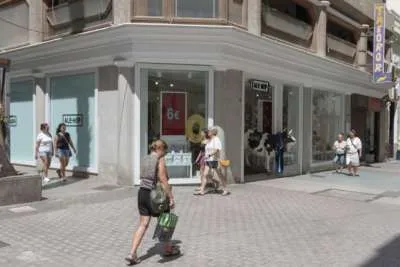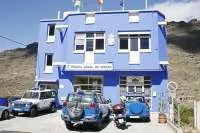How to Avoid the Common Online Traps While Living or Travelling in Spain
- 18-07-2025
- Travel
- collaborative post
- Photo Credit: Freepik
Spain's vibrant digital ecosystem is a traveller’s dream, but it is also an outlaw's haven. From a thriving 42 million-plus online community to a smartphone penetration rate of 89%, Spain's connectivity makes it easier than ever to be the target of sophisticated online scams.
Whether you're sipping a sangria in Barcelona or strolling Seville's streets, being aware of these online landmines can save you thousands of euros and your personal data.
THE CRYPTOCURRENCY MIRAGE
You've probably seen those glitzy Instagram ads for Bitcoin investments earning 300% returns, accompanied by the bonus of posting photos of expensive cars and beaches in Spain. These crypto cons are especially targeted at holidaymakers with a spending culture, as they anticipate that you're already spending money on activities, making you more likely to "invest" too.
This is how it works: You'll receive messages from Spanish crypto exchanges offering special rates for foreign visitors. They'll even provide fake testimonials from so-called American expats in Madrid. But when you transfer your money, usually through untraceable channels, it's gone for good.
Red flags are relatively obvious if you know where to look. Any guarantee of returns greater than 15% per year should immediately raise alarm bells. Spanish financial institutions in general are regulated by the CNMV (Comisión Nacional del Mercado de Valores) and will not cold call you on social media.
THE GAMBLING TRAP THAT CATCHES TRAVELLERS OFF GUARD
Online gambling is quite a sly entrapment for travellers in Spain. You are relaxing in your hotel room, maybe feeling good after a productive day of touring, and before you know it, ads for online casinos start coming to your phone. They are not random; they are geotargeted to where you are and designed to trap those tourists who have got money to spend.
Spain's gaming sector is worth over €1.7 billion annually and attracts both genuine and dodgy operators. The twist? Not all of the betting sites that launch in Spain are authorised by the Dirección General de Ordenación del Juego (DGOJ). They even try to catch tourists, who might not even be aware of Spanish gambling laws.
So, how do you know? This is where reading betting site reviews becomes crucial for anyone who is pondering offshore online gambling. Legitimate reviews will validate licensing status, payment protection, and withdrawal processing time. However, you'll also find fraudulent review sites that are intended to direct you to unlicensed operators.
Select sites that prominently display their Spanish license number and offer support in multiple languages. Legitimate operators process withdrawals in 24-48 hours, while suspicious sites take weeks to pay out, with a list of excuses.
WI-FI NETWORKS: YOUR DIGITAL PICKPOCKET
The public Wi-Fi is convenient but dangerous. Barcelona's Las Ramblas, Madrid's Puerta del Sol, and Seville's city centre are all prominent with fake hotspots that mimic legitimate networks. These "evil twin" attacks track everything you access on the internet.
The statistics are sobering: 68% of tourists admit to using unsecured public Wi-Fi for dangerous activities like banking. In larger Spanish tourist cities, cybersecurity experts estimate that 15-20% of public Wi-Fi networks are hacked or run maliciously.
You don't need to avoid Wi-Fi entirely, but you need to be smart. Café Wi-Fi is less secure than hotel networks as a whole, but nonetheless, use your cellular network for shopping and banking. If you need to use public Wi-Fi, consider investing in a reliable VPN service; it's like having your own private tunnel for web traffic.
SOCIAL MEDIA OVERSHARING: BROADCASTING YOUR VULNERABILITY
That Instagram update with your exact location in Park Güell? You have just advertised that your hotel room is unoccupied and your guard is down. Tourist social media oversharing offers several risk vectors beyond simple burglary.
Travel romance frauds have increased by 45% in Spain’s biggest cities since 2022. Fraudsters monitor social media for lonely-looking tourists who share online that they want company. They’ll pick you up on dating sites, move the conversation to WhatsApp soon enough, and then demand cash for some type of ‘emergency’ or another.
The solution is not to remain off social media entirely; it's being smart about timing and vagueness. Post those fabulous photos after you've left each destination, use general location points instead of precise addresses, and beware of anyone who seems over-interested in your travel schedule or banking account.
YOUR DIGITAL DEFENCE STRATEGY
To protect yourself online in Spain involves having a multi-layered strategy that does not interfere with your experience while abroad. Here are the basics: update your devices prior to travelling, activate two-factor authentication on all accounts, and notify your bank of your travel plans.
Think about opening a special bank account with limited money for travel expenses. This provides a firewall between your main finances and any potential compromise. Temporary tourist accounts can be had from most Spanish banks, which are very useful on extended stays.
Above all, use your own judgment. If a deal offered online while abroad appears to be too good to be true, then it most likely is. Spain's legitimate businesses and services do not have to employ hard-sell techniques or offer unrealistic returns.
The secret to secure digital travel in Spain is finding the balance between enjoyment and caution. With a knowledge of these pitfalls and a few basic security practices, you can focus on what counts, enjoying everything this amazing country has to offer without digital drama in tow.
Other articles that may interest you...
Trending
Most Read Articles
Featured Videos
TributoFest: Michael Buble promo 14.02.2026
- 30-01-2026
TEAs 2025 Highlights
- 17-11-2025


























































